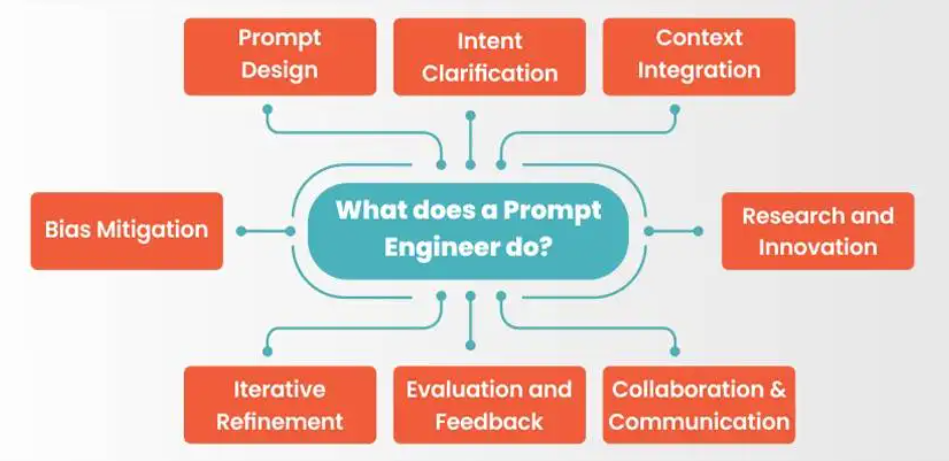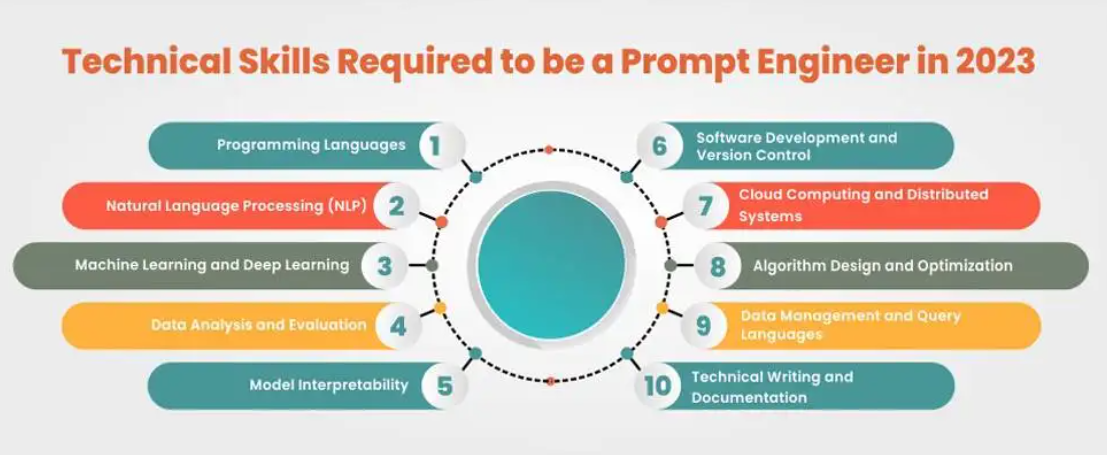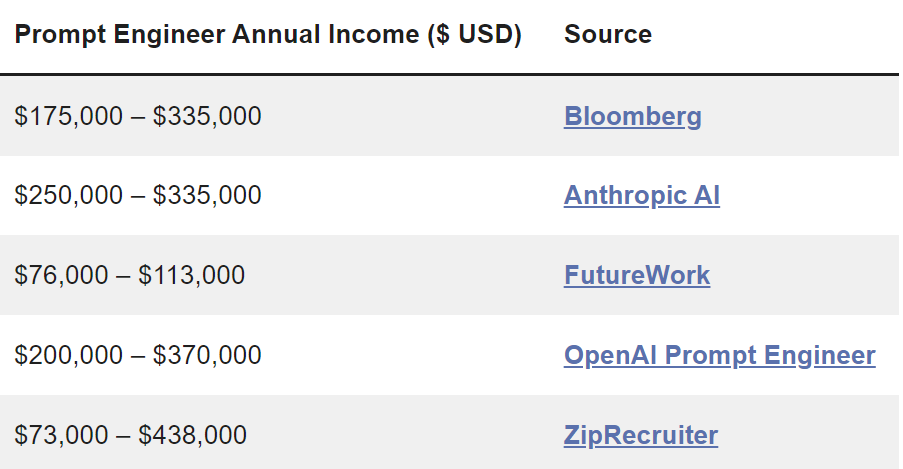So you want to become an AI prompt engineer?
Before ChatGPT went viral in late 2022, the term “prompt engineer” didn’t exist, and no one thought it was even a role that could exist.
Fast-forward to mid-2023, and highly skilled prompt engineers are already earning 6 figures.
Are you curious about how to become a prompt engineer? Is there a certification for prompt engineering?
We’ll answer all of those questions in this blog post so you can start exploring the wonders of language models.
Who knows, you might be the one to craft the next groundbreaking AI conversation!
Table of Contents:
- What is AI Prompt Engineering?
- How to Become a Prompt Engineer
- Is There a Certification for Prompt Engineering?
- Job Opportunities for AI Prompt Engineers
- What is a Typical Prompt Engineering Salary?
- FAQs – How to Become a Prompt Engineer
- Learn How to Become a Prompt Engineer and Earn 6 Digits
What is AI Prompt Engineering?
The role of an AI prompt engineer, while relatively new, is gaining recognition among tech companies. The term “prompt engineer” didn’t exist a few years ago, but today it’s one of the most sought-after roles within tech companies.
The rise of artificial intelligence and machine learning has created a high demand for skilled prompt engineers who can train and adapt AI tools to optimize large language models.
According to LinkedIn data shared with Time Magazine, there’s been an exponential increase in job postings related to “generative AI”. In fact, these posts have surged 36-fold compared to last year.
Even more striking is the 51% rise between 2021 and 2022 in job postings containing “GPT”, showcasing how rapidly this career option is growing.
An example of a successful career transition into this field can be seen through Anna Bernstein‘s journey. She shifted from being a freelance writer and historical research assistant to becoming a prompt engineer.
Despite her non-technical background, she leverages her humanities skills to craft text-based prompts that guide AI models in generating content like blog posts or sales emails.
Who Can Become a Prompt Engineer?
Bernstein’s experience shows that you don’t necessarily need technical skills or computer science degrees to excel as an AI prompt engineer. However, having practical experience implementing machine learning models could certainly provide an edge.
A variety of industries are beginning to recruit prompt engineers.
- Google-backed startup Anthropic is offering salaries up to $335,000 for creative hackers with puzzle-solving skills.
- Automated document reviewer Klarity is paying as much as $230,000 for a prompt engineer who can produce the best output from AI tools.
- Consulting firm Booz Allen Hamilton is also offering a $212,000 salary package for applicants with more than three years of experience working with machine learning models.
- Even actor Donald Glover’s new creative studio is on the hunt for the next rockstar prompt animator!
If you’re interested in how to become a prompt engineer for AI but lack relevant qualifications or experience, don’t worry! Many professionals began teaching paid online courses after they recognized the rising demand for this skill set. These programs provide theoretical knowledge along with hands-on training using real-world datasets which would be invaluable when applying your learnings later on.

Infographic from Olibr
How to Become a Prompt Engineer
Becoming a skilled AI prompt engineer isn’t something that happens overnight. It involves acquiring the right education, developing the necessary skills, and gaining practical experience in implementing machine learning models.
If you’re wondering how to become a prompt engineer, let me guide you through each of these steps:
1. Education Requirements
To become an AI prompt engineer, you need to start with the basics. This means going to school and taking courses in computer science or software engineering. These fields will provide you with fundamental knowledge of algorithms and data structures along with programming languages like Python or Java.
Specialized Courses and Workshops
In addition to formal qualifications, participating in specialized courses and workshops can greatly benefit aspiring AI prompt engineers.
Workshops focused on areas like natural language processing and machine learning are particularly valuable, as they involve writing text-based prompts for AI systems.
If time permits, consider taking MOOCs (Massive Open Online Courses) offered through platforms like edX. These courses often have modules specifically designed to enhance your understanding of artificial intelligence applications.
2. Skills Requirements
To be a successful AI prompt engineer, you need more than just a love for artificial intelligence. It requires the perfect blend of technical skills and soft skills.
Creative Thinking
Creative thinking skills are crucial for becoming a prompt engineer because crafting effective prompts requires more than just technical expertise. As an AI prompt engineer, you are essentially trying to communicate with an AI language model and elicit specific and desired responses.
Language models can be highly sensitive to the phrasing and structure of prompts. Creative thinking helps you experiment with different ways of asking questions or presenting information to get the best possible responses from the AI. Sometimes, a small tweak in the prompt can lead to significantly improved results.
When AI models struggle with uncommon or complex scenarios, your creative thinking allows you to approach these edge cases in innovative ways, finding solutions that go beyond straightforward and typical prompts.
Communication Skills
As a prompt engineer, you’ll likely work on AI applications intended for end-users. Effective communication skills enable you to engage with users, understand their requirements, and gather feedback. This feedback is invaluable for refining prompts and improving the overall user experience.
You’ll also collaborate with domain experts, product managers, and other team members who may not have technical backgrounds. Your ability to communicate complex AI concepts in a clear and understandable manner helps bridge the gap between technical and non-technical stakeholders. This ensures everyone is on the same page when defining prompt requirements.
Communication skills allow you to work seamlessly with AI developers and engineers. You need to convey prompt specifications, discuss technical constraints, and ensure that your prompts align with the AI model’s capabilities. Effective communication fosters teamwork and prevents misunderstandings that could lead to suboptimal results.
Crafting effective prompts is not just about the technical aspects but also about guiding the AI model to generate relevant and coherent responses. Your communication skills will come into play when giving instructions to the model, guiding it on the desired tone, style, or level of formality.
Technical Skills
To become an AI prompt engineer, you’ll need a solid foundation in several technical skills. Here are some essential ones:
Programming Languages: Proficiency in programming languages is fundamental. Python is the most commonly used language in the AI and NLP domains. You’ll need to be comfortable writing Python code to interact with AI models, process data, and develop AI applications.
Natural Language Processing: A strong understanding of NLP concepts is essential. You should be familiar with tasks like text preprocessing, tokenization, part-of-speech tagging, named entity recognition, sentiment analysis, and language modeling.
Machine Learning and Deep Learning: Familiarity with machine learning and deep learning principles is crucial. You should understand the concepts of supervised and unsupervised learning, neural networks, and how to train and fine-tune language models.
If you’re new to ML, Google’s guide on Text Classification might come in handy.
AI Platforms and APIs: Experience with AI platforms and APIs, such as OpenAI’s GPT-3 API, is valuable. These platforms provide access to powerful pre-trained language models that you can integrate into your applications.
Model Deployment and Integration: You should know how to deploy AI models to make them accessible to users. This may involve creating REST-based APIs, integrating AI into web applications, or building chatbots.
Version Control: Proficiency with version control systems like Git is essential for collaboration with other developers and to manage changes to code and prompt iterations effectively.
Data Analysis Skills
Data analysis skills are valuable for becoming a prompt engineer because they allow you to gain insights from data, make informed decisions, and optimize the effectiveness of your prompts.
As a prompt engineer, you’ll work with various datasets. Data analysis skills allow you to identify and address data quality issues, such as missing values, inconsistencies, or biases, which can impact prompt effectiveness.
By analyzing AI model outputs based on different prompts, you can identify which prompts lead to more accurate and relevant responses. Data-driven optimization helps improve the overall performance of the AI system.
Data analysis is also vital when conducting A/B testing with different prompts. It helps in statistically comparing the performance of different prompt variations and determining which ones are more effective.

3. Experience Requirements
Gaining practical experience as an AI prompt engineer is essential for honing your skills and becoming proficient in crafting effective prompts. Here are some practical steps you can take:
Experiment with Pre-trained Models
Start by experimenting with pre-trained language models like GPT-3.5. Many AI platforms offer access to these models through APIs. Play around with different prompts and observe how the AI responds. This hands-on experience will give you a feel for how language models work and how to optimize prompts for better results.
Build Simple Applications
Create simple applications that use language models to interact with users. For example, you could build a chatbot or a language-based game. Implementing these projects will deepen your understanding of using prompts in real-world scenarios.
Participate in Open Source Projects
Participate in AI-related challenges on platforms like Kaggle or contribute to open-source AI projects. Working with a team on real-world projects will expose you to different problem-solving approaches and industry best practices.

Screenshot from Kaggle
Work on Personal Projects
Develop your own AI projects and focus on improving prompt engineering skills. Whether it’s a creative writing assistant or a chatbot for a specific niche, hands-on personal projects will help you build a strong portfolio.
Collaborate with AI Developers
Collaborate with AI developers and engineers who are already experienced in the field. Join online communities, forums, and attend AI meetups to network with professionals. Learning from their experiences and seeking feedback on your work can be invaluable.
Stay up-to-date with the latest advancements in AI, particularly in the domain of language models and NLP. Follow research papers, read blog posts, and attend webinars or conferences. Continuous learning will keep you informed about cutting-edge techniques and methodologies.
Remember, practical experience is all about learning by doing. The more you immerse yourself in building, testing, and iterating on prompts, the more proficient you’ll become.
Is There a Certification for Prompt Engineering?
Certifications can be a great way to demonstrate your expertise in any area. Although you won’t find a prompt engineering certification issued by an official governing body, there are several relevant certifications that could validate your proficiency.
While these certificates may amplify your resume by demonstrating various aspects of competency needed for becoming skilled prompt engineers, they are not mandatory requirements.
Continuous learning is more important in an industry where technology evolves rapidly. And if you want to stay ahead in the field of prompt engineering, regular participation in online courses from platforms is highly recommended.
Check out our guide on the best AI prompt engineering courses.
Job Opportunities for AI Prompt Engineers
AI applications are no longer limited to a specific sector. AI is being integrated into industries like healthcare, finance, e-commerce, marketing, education, and more. This widespread adoption has created a demand for skilled AI prompt engineers who can develop and optimize AI prompt systems for diverse use cases.
Tech Companies and Startups
Tech businesses are at the cutting edge of this trend. Both big players and startups alike are investing heavily in artificial intelligence systems development, which requires skilled prompt engineers who have practical experience implementing machine learning models.
As a prompt engineer, you might be involved in projects ranging from creating generative AI tools to enhancing existing ones using your deep understanding of computer science.
Data Analysis Firms
Data analysis firms offer another lucrative avenue for careers as an AI prompt engineer. These organizations leverage complex datasets, providing insights that drive business decisions. Thus, they need professionals capable of writing text-based prompts facilitating efficient interaction with these sets.
Educational Institutions and Research Centers
Besides commercial entities, educational institutions and research centers also present opportunities where one can contribute towards advancing the field of artificial intelligence. As a prompt engineer, you can contribute to developing new techniques or improving upon current methodologies.
Government Agencies
Last but not least – government agencies. With digital transformation initiatives gaining momentum worldwide, including leveraging capabilities provided by artificial intelligence technologies, roles here may involve more than just implementation but could extend into shaping guidelines or policies related to usage too.
While we’ve covered some common areas offering job prospects, remember technology is ever-evolving, so keep abreast of emerging trends within this exciting field.
What is a Typical Prompt Engineering Salary?
If you’re considering a career as an AI prompt engineer, it’s only natural to be curious about your potential earnings.
So what kind of prompt engineering salary can skilled prompters expect?
Prompt Engineering Salary Range
According to Bloomberg, the average salary range of a prompt engineer is $175,000 to $375,000 per year.
At ZipRecruiter, prompt engineer jobs pay from $22 to $58 per hour, with the national average at $41.
NTT Data is looking for a remote prompt engineer to join its team in Dallas for $62 per hour, while Casetext — developer of the first AI legal assistant — is looking to hire a full-time prompt engineer in San Francisco for $160 per hour.

Source: Finxter
Factors Determining Prompt Engineering Salary
There are several factors that can influence the amount of money you can earn from a prompt engineering job.
First off: education. A deep understanding of artificial intelligence generally means higher paychecks, so those with advanced degrees often earn more than their peers with bachelor’s degrees.
Your experience implementing machine learning models also counts big time. Professionals with practical experience working extensively with generative AI tools tend to command higher salaries than newbies.
We all know location matters when it comes to job hunting (and life in general). Tech hubs such as San Francisco or New York typically offer higher compensation packages due largely to cost-of-living differences and high demand for technical skills.
FAQs – How to Become a Prompt Engineer
How do I train to be an AI prompt engineer?
- Understand AI, ML, and NLP.
- Define problem statements clearly and specify detailed queries.
- Be creative and develop your conversational skills.
- Learn about writing and art styles.
What skills do you need to be an AI prompt engineer?
To excel as a prompt engineer, one must possess exceptional problem-solving and analytical abilities, alongside an extensive knowledge of AI, natural language processing, machine learning, and the development of AI-generated content.
How do I become an artificial intelligence (AI) engineer?
- Obtain a secondary school diploma
- Complete a bachelor’s degree
- Pursue a master’s degree
- Enrol in specialized AI courses
- Earn certifications
- Acquire practical experience
Do you need a degree to be an AI prompt engineer?
A degree is often required to become an AI prompt engineer. Fields such as computer science or data science are common choices. However, relevant work experience may sometimes compensate for the lack of formal education.
Learn How to Become a Prompt Engineer and Earn 6 Digits
Embarking on the journey to become an AI prompt engineer is a fascinating one.
You’ve discovered what this role entails and its importance in today’s tech-driven world.
The educational requirements have been laid out, highlighting the need for strong technical knowledge and soft skills alike.
The job opportunities are vast and varied — it’s an industry ripe with potential!
Indeed.com alone has over 3,000 job listings for prompt engineers.
And let’s not forget about those salary expectations. They’re pretty impressive, right?
But remember, becoming successful in any field requires dedication, continuous learning, and practical application of your knowledge.
Ready to take the next step? Kickstart your career as an AI prompt engineer with this comprehensive guide.
Stay one step ahead with WorkMind’s blogs, crafted to deliver real results for students and professionals. See what we have in store for you.